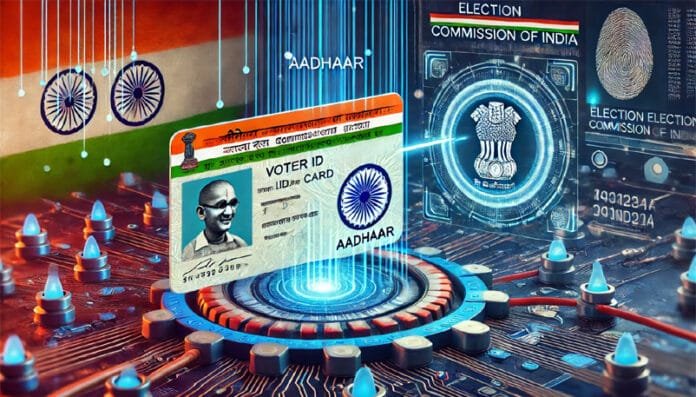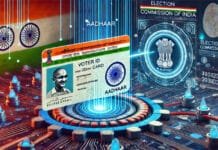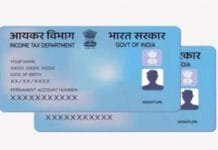Major Electoral Reform: Voter ID-Aadhaar Linkage
In a significant move aimed at curbing electoral fraud and ensuring transparency in voting, the Election Commission of India (ECI) and the Union Home Ministry have decided to link Voter ID cards with Aadhaar numbers. This decision was taken during a high-level meeting held in Nirvachan Sadan, New Delhi, under the leadership of Chief Election Commissioner (CEC) Gyanesh Kumar. The meeting saw participation from Election Commissioners Dr. Sukhbir Singh Sandhu and Dr. Vivek Joshi, along with officials from the Ministry of Electronics and Information Technology (MeitY), Unique Identification Authority of India (UIDAI), and the Legislative Department.
Legal Framework and Constitutional Provisions
The decision to link Voter ID with Aadhaar is backed by the provisions of Article 326 of the Indian Constitution, which mandates free and fair elections. The Election Commission has cited previous Supreme Court judgments and the Representation of the People Act, 1950 (Sections 23(4), 23(5), and 23(6)) to validate this move. Additionally, the Election Laws (Amendment) Act, 2021 allows voluntary linking of Aadhaar with Voter ID for authentication and elimination of duplicate voters.
Technical Discussions and Implementation Strategy
To ensure a smooth and secure linking process, technical experts from the UIDAI and ECI will conduct further consultations. The plan includes:
- Developing a robust verification mechanism to prevent voter disenfranchisement.
- Addressing security concerns related to data privacy.
- Implementing phased execution to allow citizens to voluntarily link their Aadhaar numbers.
- Organizing workshops for Electoral Registration Officers (EROs) and District Election Officers (DEOs) to streamline the process.
Why Linking Voter ID with Aadhaar is Necessary
The Election Commission has outlined several benefits of this initiative:
1. Elimination of Duplicate and Fake Voter IDs
By linking Aadhaar, instances of multiple voter registrations under different names or addresses will be significantly reduced, ensuring that each voter has only one valid identity in the electoral roll.
2. Prevention of Electoral Malpractices
Fake and bogus voting is a persistent issue in elections. Aadhaar integration will prevent impersonation and fraudulent voting, enhancing the integrity of the democratic process.
3. Smoother Voter Verification Process
Aadhaar-based authentication will enable hassle-free voter verification during elections, reducing dependency on manual checks and documentation.
4. Remote Voting for Migrant Workers
Linking Aadhaar with Voter ID will facilitate the introduction of a remote voting system, allowing migrant workers and citizens residing in different states to cast their votes without being physically present in their home constituencies.
Previous Supreme Court Intervention and Challenges Faced
The Election Commission had previously attempted Aadhaar-Voter ID linkage under the National Voter List Purification Program (NVP) in 2015. During this process, 30 crore voter cards were linked with Aadhaar. However, concerns arose when 55 lakh voters from Andhra Pradesh and Telangana were reportedly deleted from electoral rolls due to discrepancies. The matter was then taken to the Supreme Court, which halted the process, citing the absence of a robust legal framework at the time.
With the Election Laws (Amendment) Act, 2021, the legal gap has now been addressed, and the process can resume on a voluntary basis.
Political Controversy and Opposition Stand
The decision has sparked intense debates within the political spectrum. Opposition parties, including the Indian National Congress (INC), have raised concerns regarding potential voter suppression and privacy violations. Congress leader Rahul Gandhi recently criticized the initiative, claiming that it might be misused for political gains.
The Election Commission, however, has reassured all political parties that the linking process will be entirely voluntary, and no voter will be removed from the electoral rolls for non-compliance.
Timeline and Next Steps
To ensure the successful implementation of this reform, the Election Commission has outlined the following timeline:
- March 31, 2025: Meeting with Electoral Registration Officers (EROs), District Election Officers (DEOs), and Chief Electoral Officers (CEOs) to finalize technical guidelines.
- April 30, 2025: Deadline for political parties to submit their suggestions.
- Mid-2025: Pilot implementation in select constituencies.
- 2026 General Elections: Nationwide rollout (subject to Supreme Court approval and public response).
How to Link Aadhaar with Voter ID
Eligible voters can voluntarily link their Aadhaar with their Voter ID using the following methods:
1. Online Method via NVSP Portal
- Visit the National Voters’ Service Portal (NVSP): www.nvsp.in
- Click on “Link Aadhaar with Voter ID”
- Enter EPIC (Voter ID) number and Aadhaar number
- Authenticate via OTP sent to the registered mobile number
- Submit the request for verification
2. Linking via SMS
Voters can send an SMS in the following format:
ECILINK <Voter ID> <Aadhaar Number> to 166 or 51969
3. Offline Linking via Booth Level Officers (BLOs)
- Visit your nearest Electoral Registration Office.
- Submit Form 6B along with Aadhaar details.
- The BLO will verify and process the request.
Conclusion: Strengthening India’s Electoral System
The decision to link Voter ID with Aadhaar is a landmark step toward ensuring electoral transparency and security. While concerns over privacy and potential misuse remain, the voluntary nature of the process ensures that voters retain control over their data. The Election Commission and UIDAI must work together to address technical and security challenges while maintaining public trust.
As we move closer to the 2026 General Elections, this reform could potentially redefine India’s electoral landscape, making it more fraud-proof, inclusive, and efficient.
















